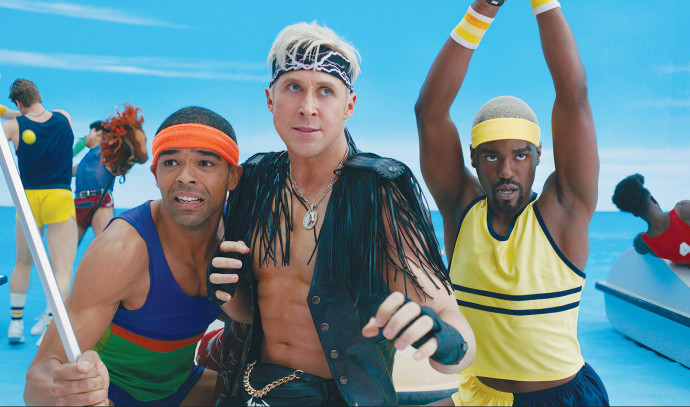Barbie’s entire narrative builds up to, of all things, a musical number.
Part power ballad, part battle sequence, and part dream ballet, “I’m Just Ken” arrives onscreen like an elaborate bit, or an excuse for Ryan Gosling to flex his Oscar-nominated vocal cords and reprise his viral dance routines. And yet it’s an absolute showstopper, one as ridiculous as it is ideologically ambitious and visually astute. Like the powerful monologue America Ferrera delivers about the impossibilities of being a woman, this five-minute sequence is an empathetic acknowledgment of the pressures put on men to (literally) perform their masculinity, often at toxic lengths.
Packed with clever jokes, film references, and social commentary, the number might seem like wildly misguided chaos. In theater terms, it’s as if the princes of Into the Woods were performing the Les Misérables battle anthem “One Day More” before a West Side Story rumble on that “Mamma Mia! Here We Go Again” yacht, all filmed on a Busby Berkeley soundstage.
So whether you loved it and want to know more about it, or you didn’t understand what was going on at all, The Times is here with #kenough guidance to make sense of “I’m Just Ken.”
I can’t get #kenough of ‘I’m Just Ken’
In the film, Gosling’s Ken – Barbie’s anxiety-ridden, try-hard, beta-status boyfriend – is revitalized by the patriarchy of the real world and returns to indoctrinate everyone in Barbieland. And though he acquires everything a man could want (Horses! Hummers! Mini fridges with beer!), he still doesn’t have the undivided attention he desperately craves from Barbie.
Shirtless in the bedroom of his Mojo Dojo Casa House, Ken laments his existence as a superfluous accessory created to complement her.
“Doesn’t seem to matter what I do, I’m always number two / No one knows how hard I tried,” Gosling sings melodramatically, to gentle piano accompaniment. Though he is playing what Times critic Justin Chang calls “the neediest, most pathetically insecure Ken of the lot,” he is doing so as intensely as he did Neil Armstrong in First Man and a pained husband in Blue Valentine.
“I just knew he could be really funny but also would mine the depths of this kind of outrageous conundrum that Ken finds himself in, as a person,” director Greta Gerwig told The Times of casting Gosling. “It was the gravitas he’s able to bring as an actor that was part of what made everything so heartfelt – but also so funny.”
Ken, who has learned the ins and outs of patriarchy through the real world’s media, puts on what he believes to be the outfit of a successful and powerful man: a Sylvester Stallone-esque mink coat, a black fringe sleeveless vest, a headband decorated in electric bolts, a silver chain with a horse pendant and a fanny pack with his name in the Metallica font. (Despite everything he’s wearing, he manages to remain shirtless.)
“I have feelings that I can’t explain / drivin’ me insane,” he sings with a crazy-eyed expression, shaking his head in frustration. “All my life, been so polite, but I’ll sleep alone tonight.”
Gosling’s Ken then heads into the long-teased “beach-off” with his archrival: Ken (Simu Liu), who constantly undercuts him in front of Barbie, and repeatedly makes him feel inadequate. Gosling’s mob rides into battle on paddle boats reminiscent of cannon-loaded ships, while Liu’s crew carries him over their shoulders, spinning umbrellas like wheels and holding stick horses as if they were human chariots.
AS THEY approach each other in a comical slow-motion – and with a threatening arsenal of frisbees, beach balls, tennis rackets, and pool floaties – Gosling’s Ken continues to reflect on his romantic impotence, which spirals into an identity crisis. “I’m just Ken / Anywhere else I’d be a 10 / Is it my destiny to live and die a life of blond fragility?” he wails over Wolfgang Van Halen on the electric guitar and Foo Fighters’ Josh Freese on the drums.
“I’m just Ken / Where I see love, she sees a friend / What will it take for her to see the man behind the tan, and fight for me?”
“You really fall in love with this hapless but immediately sympathetic figure,” explained Mark Ronson, who wrote “I’m Just Ken” with Andrew Wyatt. “It felt a little bit emo, like, ‘This poor guy. He’s so hot, but can’t get the time of day.’”
“I’ll see you on the Malibu beach!” Gosling suddenly shouts with the conviction of Mel Gibson in Braveheart or Russell Crowe in Gladiator. The two sides charge toward each other screaming, with their weapons held high. The Kens twist each other’s nipples, sword fight with lacrosse sticks, and fire off suction-cup arrows – one of which Gosling pulls off his pec in wounded disbelief. The whole scene is vibrant, goofy pandemonium – these are toys fighting each other with toys – but the actors all play it straight as if these Kens are ready to end lives and lose their own.
Meanwhile, Gosling’s Ken continues his melancholic monologue about his purpose and self-worth, now to a more upbeat rhythm. “I wanna know what it’s like to love, to be the real thing,” he sings, with a hunger in his eyes. “Is it a crime? Am I not hot when I’m in my feelings?” This internal interrogation – vulnerable questions he’s likely asking himself for the first time – is hilariously juxtaposed with stereotypical “masculine” actions, such as giving another Ken a noogie with his fingerless-leather-gloved fist and blocking an attack with the mere display of his abs.
Gosling and Liu’s Ken-on-Ken clash sets off a collective trance, transporting the action to a pink-and-blue soundstage. In a tribute to the stylized dream ballets of golden-age musicals like Oklahoma! and Singin’ in the Rain – both of which Gerwig screened for the cast during filming for inspiration – a total of 44 Kens, wearing black outfits and Barbie-pink socks, absurdly strike each other with aggressive dance moves, choreographed by Jennifer White and Lisa Welham: flexing biceps, throwing up claws while making cat sounds, pretending to rip off your shirt like a superhero and punching toward the ground on the downbeat.
AFTER URGENTLY spinning in symmetrical formations to full-on 80s synthpop, Gosling’s Ken is revealed anew. He again sings the chorus, but this time, he’s standing tall, staring directly into the camera with a knowing smile. He helps his fellow Kens up from the floor and giggles after they kiss him on the cheek in gratitude. He is no longer threatened by other men, or the expression of affection among them.
“I’m just Ken and I’m enough / And I’m great at doing stuff / So hey, check me out, yeah, I’m just Ken,” the Kens sing in unison as Guns N’ Roses’ Slash shreds the guitar on a final solo. “My name’s Ken (And so am I) / Put that manly hand in mine / So hey, world, check me out, yeah, I’m just Ken.”
Shortly after “I’m Just Ken” ends, Kingsley Ben-Adir’s Ken tells the crowd, “We were only fighting because we didn’t know who we were.” Though the song’s title starts as a negative, describing Ken as inessential, the group elevates it to a chant of self-affirming validation, one that stops them from warring with each other and themselves. (It’s a profound realization expressed in simple terms. He is still Ken, after all.)
Gosling’s Ken later denounces the patriarchy and learns from Barbie not to define himself by his possessions, his relationship, or his job of just “beach.” He’s just Ken, and he’s Kenough.
In just over five minutes, “I’m Just Ken” resolves the narrative and emotional arc of Gosling’s Ken, transforming him from a petty, vengeful villain into a man who got caught up in society’s toxic masculinity – a taboo topic for plenty of men in real life.
That may explain why Barbie has been dismissed by right-wing pundits as “possibly the most anti-male film ever made.” Of course, this line of reasoning doesn’t account for the fact that the male characters are given a lengthy, layered, climactic moment in a movie about a doll for girls.
“Life is hard for everybody,” said Gerwig to The Times. “I think equally men have held themselves to just outrageous standards that no one can meet. And they have their own set of contradictions where they’re walking a tightrope. I think that’s something that’s universal. Just as much as women have been lost in some morass of how to do everything. I equally see that as true for men. For everybody. We equally beat ourselves up.”
Oscar pundits are already eyeing possible original song nominations for Ronson and Wyatt, who previously won for their work on the A Star Is Born hit “Shallow.” Gosling’s name is being tossed in as well for his performance. But he doesn’t take credit outright, especially for “I’m Just Ken.”
“Ken sang that song,” he told The Times with a straight face. “I never sang like that in my life. I don’t know why or how that happened.



